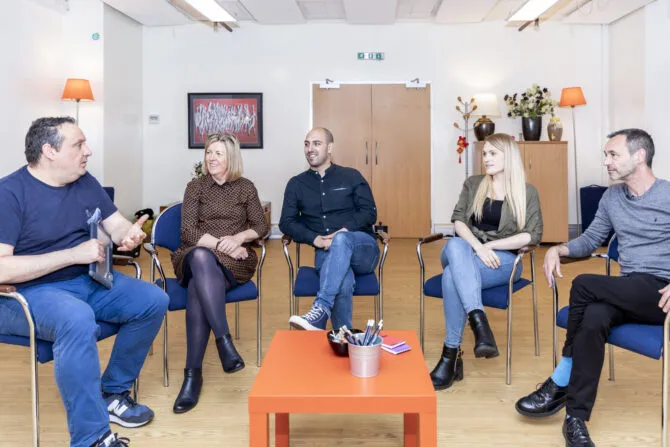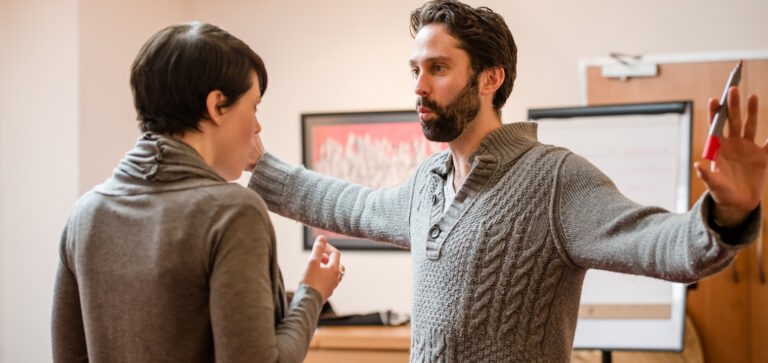Storytelling for Business Course
Our Storytelling for Business course will help you communicate with passion and engage directly with peoples’ feelings.
- Maximum 8 Delegates
- Two Trainers per Course
- Money Back Guarantee
I came not knowing what to expect but left full of confidence after the training. I have applied the lessons learnt and got good feedback. We greatly recommend it.
One-to-One Skills Training
If you would prefer One-to-One Storytelling for Business Training, we offer a 2-hour online Zoom call format for yourself or your colleagues. Please contact us to discuss your requirements.
This course helps you with
The Power of Storytelling
Demystify Telling A Story
Bring Facts and Figures To Life
Creating a Compelling Narrative
How To Structure A Story
Making Presentations Dynamic
Creating Buy-In
Strategic Storytelling
Talk To Us About This Course
- Call us
- +44 (0)20 7226 1877

Book this Storytelling for Business Course
This course is only available as one-to-one skills training.
Please contact us to discuss further options.
If you want to book 4 or more people on to a single course, please contact us:
- Call +44(0)20 7226 1877
- Email enquiries@impactfactory.com
Location
London Training Rooms,Suite 121
Business Design Centre,
52 Upper Street,
London, N1 0QH
Running time
{{courses[0].StartTime | formatTime}} - {{courses[0].EndTime | formatTime}}
Format
This course is available in Face-to-Face, Hybrid and Remote formats unless otherwise stated.
This course is available in Hybrid format only.
This course is available in Face-to-Face format only.
This is a Hybrid Course
All of our Hybrid courses can be attended either in-person or remotely. Your choice!
This stunning new ‘Hybrid’ technology makes Remote Learning feel like being there with everyone else in a supportive community!
Ideal for International Customers
Our Hybrid courses are the ideal choice for international customers who would like the quality of an intimate meeting and the convenience of remote learning.
Data-driven information tends to speak to people’s intellect – while stories stir their imagination and reach their feelings.
That’s what makes stories such a powerful tool to engage and motivate.
This Storytelling for Business course will help you communicate with passion and engage directly with peoples’ feelings.
We will equip you with the skills and confidence to use the power of storytelling in business.

Course Benefits
This Storytelling for Business Course is limited to 8 delegates ensuring personal attention to everyone on the course.
2 quality trainers per group means a total focus on you.

Storytelling for Business Course
DAY ONE:
Communicate with passion and stir the imagination to reach peoples’ feelings.
- History of Storytelling
- Why Tell Stories?
- Storytelling Elements
- Sitting Around The Table
- A Different Perspective
- The Most Important Thing
- Bringing Data Alive
- Connective Phrases and Analogies
- Story Structure
- Business Challenge
Looking for a tailored in-house Storytelling for Business for a group or teams?
CLICK HERE TO FIND OUT MORE
History of Storytelling
How we are hardwired to respond to stories
How stories can be powerful tools to use in business
Why Tell Stories?
Explore the neuroscience behind why stories resonate with us
Jumpstart storytelling
Invite participants to share a story
Create an emotionally expressive environment for the rest of the day
Storytelling Elements
Unpick the stories people have told in terms of structure and storytelling devices
Sitting 'Round the Table
Delegates will ‘sit around the table’ (Campfire!) weaving storytelling elements into a business idea
A Different Perspective
Retell the story from one (often minor) character’s perspective.
How this impacts the power of the story and changes how we hear it
The Most Important Thing
What people remember and how they remember it
Explore the questions:
- Can you change the Most Important ?
- Why would you want to?
- What impact would that have?
Bringing Data Alive
Use your data and facts to tell the story you want rather than leaving it to chance
How assumptions and misinterpretations can be made
Storytelling Techniques
Different storytelling techniques that have proven effective in business
Apply those techniques to your own situations and challenges
Connectives
How connective phrases enhance stories and can build anticipation or tension
Analogies
Practice creating analogies that help when there is factual information/ numbers /data to deliver
This exercise can also look at the ‘meaning’ behind numbers
Story Structure
Introduce a variety of story structures
Choose three to demonstrate depending upon what would be most appropriate for the delegates on the day
Business Challenge
In pairs, delegates will choose a business idea for which they want buy-in
Use one story structure that most fits their personal style write and present a strategic story, building a compelling case for their idea
I came not knowing what to expect but left full of confidence after the training. I have applied the lessons learnt and got good feedback. We greatly recommend it.
I can say that I’ve been using and encouraging others to use more pausing as well as encouraging them to use more storytelling for purposes of creating a personal connection and engagement.
Interactive and engaging sessions, with lots of opportunity to role-play, get feedback and the chance to implement feedback immediately. Katie and James were engaging and encouraging facilitators. I appreciated their attentiveness to individual’s goals for the session and their personalised feedback that helped realise growth and development even in the session itself.



















